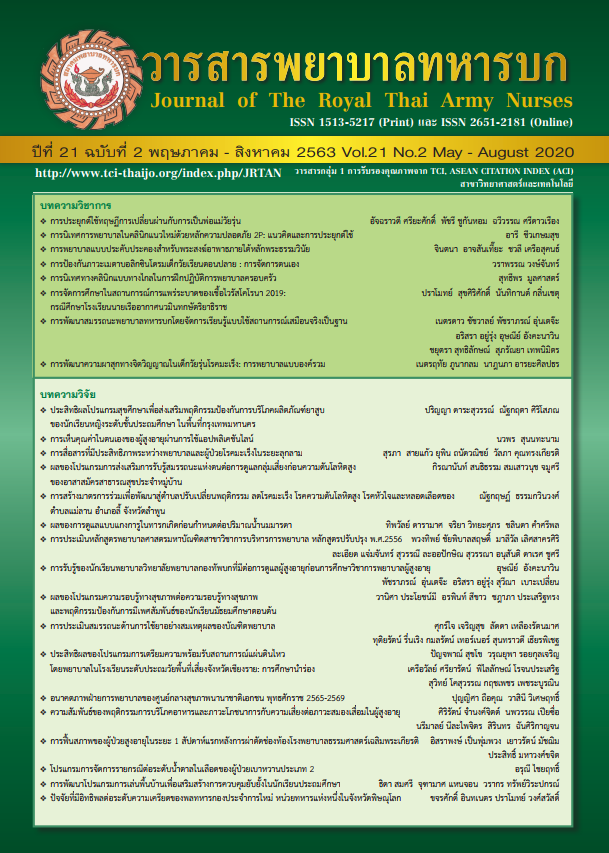Perception of Caring Among Patients with End-Stage Renal Failure Disease Undergoing Continuous Ambulatory Peritoneal Dialysis
Keywords:
Perception of Patients, Caring, Patients with End-Stage Renal Failure Disease, Continuous Ambulatory Peritoneal DialysisAbstract
The purpose of this qualitative research was to explore the experience of perception of caring among patients with end-stage renal failure disease undergoing continuous ambulatory peritoneal dialysis. Data were collected through in-depth interviews with 30 selected participants by the semi-structured interview guide. Data were collected and analyzed up to a certain time that researchers had sufficient information and saturation. The results of the study showed that 4 issues: (1) The meaning of caring (consisted of caring in period of treatment decision and help care/treatment following) (2) Nursing intervention which shown caring (consisted of having knowledge and be expertise, showing understand and compassionate, always have time) (3) Factors affected to caring (consisted of personal character of nurse and behavior of patients and family) (4) The expectation of being caring (consisted of providing knowledge/advise without asking and comfortable getting/continuous following). The result of the study can be used as the guidelines for caring to the needs of patients.
Downloads
References
Kidney Transplant Project 2015. Bureau of Information Office of The Permanent Secretary of MOPH. Ministry of Public Health. 2015. (In Thai)
Dhanakijcharoen P, Sirivongs D, Aruyapitipan S, Chuengsaman P, and Lumpaopong A. The “PD First” policy in Thailand: three-years experiences (2008-2011). Journal of The Medical Association of Thailand, 2011; 94(4): 153-161. (In Thai)
National Kidney Foundation. Glomerular Filtration Rate(GFR). New York, NY 10016; 2017
The Nephorology Society of Thailand. Clinical Practice Recommendation for Comprehensive Conservative Care in Chronic Kidney Disease 2017. Bangkok: Text and Journal Publication LTD. 2017; 1-37. (In Thai)
Naruemon K. Nursing care for patients with end stage renal disease (ESRD) having peritonitis from continuous ambulatory peritoneal dialysis. Mahasarakham Hospital Journal, 2015; 12(2): 81-91. (In Thai)
Thongtong S. Nursing role in supporting self-management of Continuous Ambulatory Peritoneal Dialysis patients. Journal of Health Research and Innovation. 2018; 1(1): 46-57. (In Thai)
Hansson J.H., & Watnick S. Update on Peritoneal Dialysis: Core Curriculum 2016. American Journal of Kidney Diseases. 2016; 67(1): 151-164.
Watson J. Nursing: The philosophy and Science of Caring (rev. ed.), Boulder: University Press of Colorado. Nursing Research. 2008; 40: 161-166.
Munhall P. Nursing Research: A Qualitative Perspective. Miami, Florida, USA: Jones & Bartlett Learning.LLC; 2011: 111-225.
Wongsaree C. & Praneetham W. The study of Relationship and Factors Influencing of Dietary And Fluid Consumption among End Stage Renal Disease Patient Receiving Hemodialysis. Journal of The Royal Thai Army Nurses. 2018; 19(3): 117-125. (In Thai)
Potisita S. Science and Arts of Qualitative Research. Bangkok: Chulalongkorn University; 2019. (In Thai)
Abalos EE, Rivera RY, Locsin RC, & Schoenhofer SO. Husserlian Phenomenology and Colaizzi’s Method of Data Analysis: Exemplar in Qualitative Nursing Inquiry Using Nursing As Caring Theory. International Journal of Human Caring. 2016; 20(1): 19-23.
Muksiritipanun B, Pongsathonviboon K, Soovit B, Jensuwan A. & Wongrostrai Y. Spiritual Well-Being and Needs Among Patients with End-Stage Renal Disease, Faculty of Medicine Vajira Hospital, Navamindradhiraj University. Spiritual Well-Being and Needs among ESRD Patients. 2018; 38(1): 63-74. (In Thai)
Lam LW, Lee Diana TF, & Shiu Ann TF. The Dynamic Process of Adherence to A Renal Therapeutic Regimen: Perspectives of Patients Undergoing Continuous Ambulatory Peritoneal Dialysis. International Journal of Nursing Studies. 2014; 51: 908–916.
Chaiyasit Y, Korcharoenyos C, & Koontalay A. Experiences and Self-management Methods of Patients with End Stage Chronic Kidney Disease Who Were on Hemodialysis. Journal of Nursing and Health Suan Sunandha Rajabhat University. 2018; 1(2): 43-61. (In Thai)
Leininger MM. Culture Care Diversity and University : A Theory of Nursing. Nation League of Nursing Press, New York. 1991; 5-68.
Khansamree O, & Ratchukul S. Professional Nurse’ Competencies in Caring of Peritoneal Dialysis Patients, Government Hospitals. Ramathibodi Medical Journal, 2010; 33(2): 57-64. (In Thai)
Chongjarearn A, Ponathong C, & Yongson. C. The Confirmatory Factor Analysis of Nursing Students’ Caring Characteristics. Journal of The Royal Thai Army Nurses. 2018; 19 (Supplement): 354-364. (In Thai)
Thomas D, Newcomb P, & Fusco P. Perception of Caring Among Patients and Nurses. Journal of Patient Experience. 2019; 6(3): 194–200.
Artsanthia J, &Tillaput J. The effect of Palliative Care to Quality of Life of People who Living with End Stage Renal Disease in Community. Journal of The Royal Thai Army Nurses. 2019; 20(1): 226-236. (In Thai)
Nanna P, Yongsiri S, & Kumphubud P. Health Status of Peritoneal Dialysis Patients in Burapha University Hospital. Academic Research 2013; 1-128. (In Thai)
Posivila N. The Outcomes of Utilizing Clinical Nursing Practice Guidelines in Caring Patients in Continuous Ambulatory Peritoneal Dialysis at Home: Master of Nursing Science (Community Nurse Practitioner) [Thesis] Nakonpatom: Christian University; 2014. (In Thai)
Downloads
Published
How to Cite
Issue
Section
License
บทความหรือข้อคิดเห็นใดใดที่ปรากฏในวารสารพยาบาลทหารบกเป็นวรรณกรรมของผู้เขียน ซึ่งบรรณาธิการหรือสมาคมพยาบาลทหารบก ไม่จำเป็นต้องเห็นด้วย
บทความที่ได้รับการตีพิมพ์เป็นลิขสิทธิ์ของวารสารพยาบาลทหารบก
The ideas and opinions expressed in the Journal of The Royal Thai Army Nurses are those of the authors and not necessarily those
of the editor or Royal Thai Army Nurses Association.






